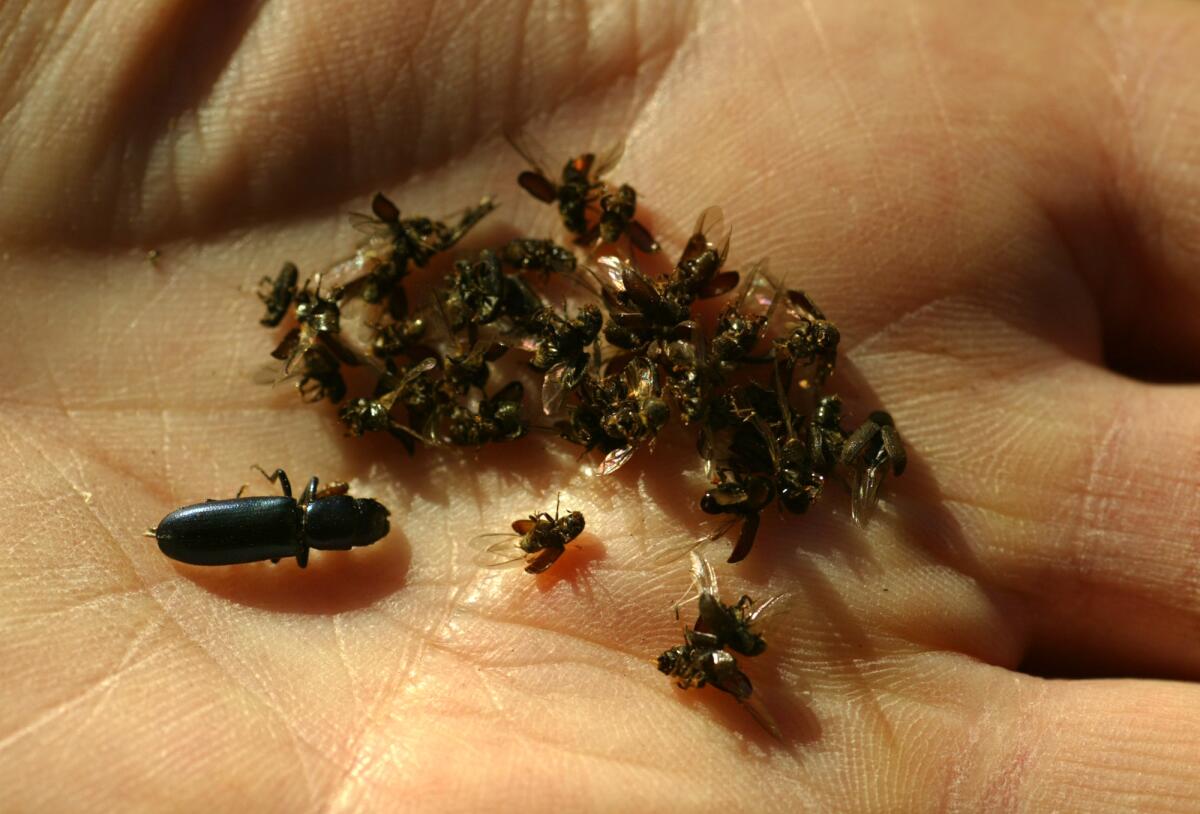Meet the insect that helped fuel Northern California’s Valley fire destruction

An example of dead western pine beetles alongside a bark beetle, left, from a trap set in Barton Flats in San Bernardino.
Call it a vicious cycle: drought, wildfires and bark beetles.
California’s historic drought stresses trees across the state, making them ideal prey for bark beetles. The insect infestations dry out vegetation further, creating forests that can light up like tinder. Fires then damage more trees, attracting more beetles, and turning more forests brown.
“So we all have to hope for rain,” said Tom Smith, park pest management specialist for the Central and Southern Sierra Region for the California Department of Forestry and Fire Protection.
California fire updates: The latest on the Valley and Butte blazes >>
Bark beetles probably exacerbated the fire that ravaged Lake County over the weekend, he said. Experts called the Valley fire’s rapid spread unprecedented; the blaze, which began Saturday afternoon, grew to more than 40,000 acres in fewer than 12 hours.
“This last couple years has just been so extreme that everything’s under stress,” Smith said. “If we weren’t in the drought, we wouldn’t have so much bark beetle.”
He said there’s been heavy beetle activity in Lake County, and around Clear Lake, where the Valley fire is blazing. A U.S. Forest Service survey of the region in and around the Bay Area in June found that though tree mortality was increasing almost everywhere, the worst region by far was an area south of the lake.
UC Berkeley fire science professor Scott L. Stephens agreed that bark beetles in the area likely left dead trees ready to go up in flames. “There’s no doubt that’s going to enhance a fire,” he said.
He said that dead pine trees are much easier to catch on fire when they still have their needles, and they don’t lose them until a year after beetles kill them. Though pines that have been dead for years aren’t quick to ignite, the recently killed ones are standing fuel, he said.
Dried-out trees combined with low humidity and parched vegetation -- both live, such as shrubs, and dead, such as fallen leaves -- created a dangerous combination that made the Valley fire spread at breathtaking speed, he said.
The fires currently raging across the state -- there are more than a dozen -- will kill some of the trees that bark beetles are feeding on, ending infestations, Smith said.
Read more about California wildfires >>
However, the fire will also damage green trees, making them newly susceptible to bark beetles.
“It creates an even worse situation,” he said.
Smith said that bark beetles are normal in California, but their activity is typically limited and goes unnoticed. This, he said, is an epidemic.
Trees’ natural defense against the tiny brown insects is their sticky resin. Experts say that water in properly hydrated trees pushes resin out of the tree’s surface, deflecting beetles that don’t want to get caught in it.
A dried up tree, however, can’t produce additional resin to protect it from beetles. In the San Bernardino forest, bark beetle infestations were considered a factor in deadly fires in 2003.
The worst infestation currently, Smith said, is in the southern Sierra Nevada. Beetle activity is more severe in places where the effects of the drought are more severe, he said. So as the drought continues, he expects the insects to keep entering new counties and spreading the epidemic further.
“It’s definitely the worst I’ve ever seen,” said Smith, who’s been doing this work in California for more than 13 years. The bugs can turn a tree from green to brown in just three to four weeks, he said.
A report released earlier this year from the U.S. Forest Service estimated the drought has killed off at least 12.5 million trees in California’s national forests. Scientists say they expect the die-off to continue as the drought persists.
Smith said he’s hoping for an El Nino.
“Until the rains come, I’m not sure what’s going to happen,” he said.
Follow @skarlamangla on Twitter for more L.A. news.
MORE ON CALIFORNIA WILDFIRES:
Valley fire spread with ‘mind-boggling’ speed, experts say
In candid online forum, firefighters chronicle Valley fire’s wrath
1 killed and 13,000 displaced by raging Valley fire in Northern California
More to Read
Sign up for Essential California
The most important California stories and recommendations in your inbox every morning.
You may occasionally receive promotional content from the Los Angeles Times.









